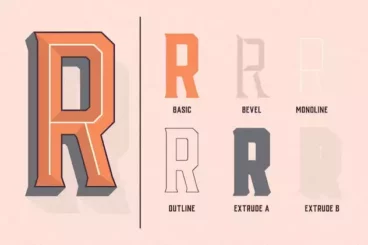Vhiena 3D Layered Font



Vhiena 3D Layered Font is a distinctive typeface, perfected with a stylish 3D effect. The unique design is ideal for creating eye-catching titles and headings, designed to engage the reader. This typographical treasure offers a regular font as well as seven different layered styles, intended to elevate your creations to new heights.
Originating from the charm of old serifs, whiskey bottles and vintage labels, Vhiena promises a taste of the past with every keystroke. Beyond adding depth to your texts, the font transforms them into captivating works of art. The substantial influence of alcohol branding adds a rustic touch, making it a great fit for a vast array of brands.
Having gone through a transformation, from a simple vintage typeface to a layered font, Vhiena now opens doors to unbounded possibilities. Essentially, it's a versatile toolkit composed of one basic font and seven effect styles, ready to take your typography to a whole new level.
Details & Features
- Unique 3D layered effect
- One basic font with seven diverse styles
- Inspired by vintage whiskey bottles and old labels
- Perfect for creating engaging titles and headings
- Easily adaptable for various brands
- Allows for endless creative possibilities
- Instantly transforms text into captivating works of art
Why We Like It
We're big fans of the Vhiena 3D Layered Font for its creative versatility. It presents a unique fusion of vintage elegance and modern 3D design, making it a standout choice. With layered style options, it grants unlimited possibilities for standout typography. This isn’t just a font; it’s an artistic tool for typographic magic.



